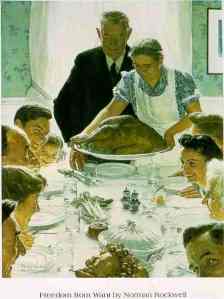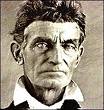 On finding myself alone at a mealtime, I’d reach for something to read while eating. It was multi-tasking, something I still considered a virtue. Too often after a mealtime spent reading, I could barely recall what I had eaten.
On finding myself alone at a mealtime, I’d reach for something to read while eating. It was multi-tasking, something I still considered a virtue. Too often after a mealtime spent reading, I could barely recall what I had eaten.
As a child in Catholic school, I had been taught the Graces Before and After Meals, prayers that were rarely if ever said in the absence of clergy. On a day last year, alone in the house, and ready to tuck into one of my ample lunches, I rooted the recent mail for the latest New Yorker or New York Review of Books. To my surprise, an obvious and disconcerting reality entered my mind. Despite my best efforts not to think about such things, I found I was facing one of my own “inconvenient truths;” there were at that moment, millions of people all around the world for whom hunger was more than a marginal urge, for whom eating was more than a function of choices.
Unable to banish or deny the realization that there is actual widespread starvation in the world, that there were really children stunted by malnutrition, I fell back upon that long-remembered prayer, “Bless of Oh Lord for these thy gifts, which we are about to receive, through thy bounty, through Christ our Lord, Amen.” I put aside my intended mealtime reading material before starting my lunch. It wasn’t much, but it was a start.
In the course of my life, I may have skipped a meal now and then. There were the Lenten observances and the days of fast and abstinence during my far off childhood. And even those, in our marginally observant family, were far from rigorous, and always open to the most liberal of interpretations. But among the far too many things I’d chosen to ignore was an unquestioned assumption that I held an entitlement to eat whenever and whatever I choose.
Being human is, of necessity, to live within the context of history. In this time and this place, we’ve been led to believe that we’ve been granted a unique dispensation from the flow of history. Solidly, if newly, middle-class in what still feels like the first of first world countries, I do not have to look very far back in my own family; three, four generations at most, to find more sobering attitudes toward the prospects of securing one’s next meal.
I’ve no personal documentation, nor do I need any, to assert that my Irish peasant ancestors faced periods of absolute need, of hunger and exposure, experiences utterly removed from my own experience. My father spoke of his illiterate and penniless parents emigrating here from the barren West of Ireland at the end of the nineteenth century. My mother’s people, more assimilated, deracinated might be the better word, laid claims to being in this country at the time of the Civil War. Only recently was I able to parse that assertion into the probability of their being what were called at that time, “Famine Irish,” a term that carries its own horrific story.
Never having known genuine scarcity, most of us have come to accept plenitude as our due. The very idea of “normal” presumes an unwarranted and illusory sense of permanence, an exemption from the too often dire consequences of history. It no longer seems necessary to sanctify the routine acts that are the basis of our sustenance, of our very existence. Once a year on the fourth Thursday in November, somewhere amid images of Pilgrims and Indians, we collectively participate in ritual expressions of gratitude for our bounty. For most of us, that’s about it. With my ancestral history as a personal context, the tuna salad sandwich on my plate began to take on sacral qualities, not something to be taken absent-mindedly with the day’s Op-Ed page.
I can no longer read while eating. Instead, I do my best to focus on my every mouthful of food, be it a bowl of cereal, a fast food sandwich or a holiday dinner. Within my small insight lies the possibility of ever more openings to gratitude, and within those, a hope that such revelations will encourage a more generous, more active charity on my part, particularly toward those who would find my need for distractions at mealtime beyond imagining.
 I found myself befuddled after being drawn, more than willingly, into a political discussion with an old friend. At one point I was accused of advocating “Socialiam” (gasp!), and I let the comment go unchallenged. Later I drafted the reply below. The reply that remains and will remain unsent.
I found myself befuddled after being drawn, more than willingly, into a political discussion with an old friend. At one point I was accused of advocating “Socialiam” (gasp!), and I let the comment go unchallenged. Later I drafted the reply below. The reply that remains and will remain unsent.  Driving through cold rain and heavy traffic to pick up some lunch, I overtook an old barge of a car waddling along doing about twenty-five in what was a forty-five zone. A disheveled early 1980s station wagon, its flashers were on and its read-end was plastered with “Right to Life” stickers. As a card-carrying subscriber to The New Yorker and the NYRB, my opinions can be largely predictable. I shook my head as I sped past the crawling low- end heap and what I reflexively assumed was its yahoo driver.
Driving through cold rain and heavy traffic to pick up some lunch, I overtook an old barge of a car waddling along doing about twenty-five in what was a forty-five zone. A disheveled early 1980s station wagon, its flashers were on and its read-end was plastered with “Right to Life” stickers. As a card-carrying subscriber to The New Yorker and the NYRB, my opinions can be largely predictable. I shook my head as I sped past the crawling low- end heap and what I reflexively assumed was its yahoo driver.  In coming to grips with an issue as disturbing as abortion, the most powerful touchstone against any kind of certainty could be the case of John Brown, the anti-slavery John Brown of Russell Banks’ novel “Cloudsplitter,” the absolute fanatic Pottawatomie Brown, the unrepentant murderer Osawatomie Brown. Deemed a deranged psychotic by most of his fellow Americans and executed by his government, poor, mad John Brown, in his time and in his place, just may have been the only sane man in The United States of America. His example is one to give pause to received, hasty or unexamined opinions.
In coming to grips with an issue as disturbing as abortion, the most powerful touchstone against any kind of certainty could be the case of John Brown, the anti-slavery John Brown of Russell Banks’ novel “Cloudsplitter,” the absolute fanatic Pottawatomie Brown, the unrepentant murderer Osawatomie Brown. Deemed a deranged psychotic by most of his fellow Americans and executed by his government, poor, mad John Brown, in his time and in his place, just may have been the only sane man in The United States of America. His example is one to give pause to received, hasty or unexamined opinions.  A revelation yesterday on my way to Home Depot. On a four-lane county highway, a forty mile-an-hour zone, I was in the right lane moving slowly past an Infiniti sedan that was blocking the left lane despite there being no one in front of it. In my rear view mirror I spotted a rapidly approaching BMW, looked like a new one, a convertible with the top down. I could see that the driver; white-shirted, lots of hair, sunglasses on top of his head and talking on a cell phone, was closing the gap between himself and the Infiniti. Mr. Wonderful swung sharply in behind me, nearly riding my back bumper. He seemed to figure he could push me until I got far enough ahead of the Infiniti so he could swing left, pass me and leave the lane blocker behind. My default setting in these situations has become more and more to succumb to an irresistible urge to play fuck-around.
A revelation yesterday on my way to Home Depot. On a four-lane county highway, a forty mile-an-hour zone, I was in the right lane moving slowly past an Infiniti sedan that was blocking the left lane despite there being no one in front of it. In my rear view mirror I spotted a rapidly approaching BMW, looked like a new one, a convertible with the top down. I could see that the driver; white-shirted, lots of hair, sunglasses on top of his head and talking on a cell phone, was closing the gap between himself and the Infiniti. Mr. Wonderful swung sharply in behind me, nearly riding my back bumper. He seemed to figure he could push me until I got far enough ahead of the Infiniti so he could swing left, pass me and leave the lane blocker behind. My default setting in these situations has become more and more to succumb to an irresistible urge to play fuck-around.  What ever has happened to the Roman Catholic Church, my church, the one I knew in the nineteen-forties and fifties, the church that seemed to utterly dominate my childhood? What happened?
What ever has happened to the Roman Catholic Church, my church, the one I knew in the nineteen-forties and fifties, the church that seemed to utterly dominate my childhood? What happened?  The Surrealist movement of the early to mid-twentieth-century has not held up very well. It’s all come to seem and feel rather quaint; the soft clocks, the agoraphobic landscapes and supposedly jarring juxtapositions. The avant-garde aspects of life as it’s now experienced has rendered the entire idea of “surrealism” irrelevant.
The Surrealist movement of the early to mid-twentieth-century has not held up very well. It’s all come to seem and feel rather quaint; the soft clocks, the agoraphobic landscapes and supposedly jarring juxtapositions. The avant-garde aspects of life as it’s now experienced has rendered the entire idea of “surrealism” irrelevant. As expected, the bible says it best: “Vanity of vanities; all is vanity.
As expected, the bible says it best: “Vanity of vanities; all is vanity.  I got cranky last night watching the Super Bowl. Other than the playing of the game itself, the whole self-congratulatory vibe of the NFL has always kind of pissed me off, seeming to exemplify everything that’s gone wrong with this country over the past forty or fifty years. They did have Bruce on at halftime, and last year it was Tom Petty. But last night, awash in the worst a crassly commercial culture can dish out, I couldn’t help but contrast the celebratory hype for so many lousy overblown movies, the outrageously overproduced commercials for sugar-water sodas and the pitches for more outsized, gas-guzzling cars and trucks, all of it against the backdrop of an ongoing economic disaster. It all seemed just so inappropriate, so tone-deaf, so like striking up the orchestra on a sinking ship.
I got cranky last night watching the Super Bowl. Other than the playing of the game itself, the whole self-congratulatory vibe of the NFL has always kind of pissed me off, seeming to exemplify everything that’s gone wrong with this country over the past forty or fifty years. They did have Bruce on at halftime, and last year it was Tom Petty. But last night, awash in the worst a crassly commercial culture can dish out, I couldn’t help but contrast the celebratory hype for so many lousy overblown movies, the outrageously overproduced commercials for sugar-water sodas and the pitches for more outsized, gas-guzzling cars and trucks, all of it against the backdrop of an ongoing economic disaster. It all seemed just so inappropriate, so tone-deaf, so like striking up the orchestra on a sinking ship. It’s easy to forget the shallow Cold War triumphalism, particularly from the American Right, that followed the collapse of the Soviet Union. Now with free-market economies worldwide in disarray, the words of Juan Goytisolo’s 1993 novel, The Marx Family Saga echo with prescience.
It’s easy to forget the shallow Cold War triumphalism, particularly from the American Right, that followed the collapse of the Soviet Union. Now with free-market economies worldwide in disarray, the words of Juan Goytisolo’s 1993 novel, The Marx Family Saga echo with prescience.  On finding myself alone at a mealtime, I’d reach for something to read while eating. It was multi-tasking, something I still considered a virtue. Too often after a mealtime spent reading, I could barely recall what I had eaten.
On finding myself alone at a mealtime, I’d reach for something to read while eating. It was multi-tasking, something I still considered a virtue. Too often after a mealtime spent reading, I could barely recall what I had eaten.